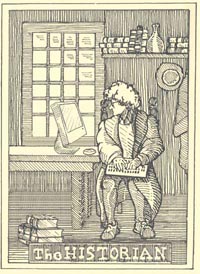
Although I presume Facebook is aware that they can further enhance the value of the content users share – photos, documents, videos and a huge amount of text – with consistent metadata and semantic linking, the opportunity exists to document, preserve and curate what must be the world's largest corpus of modern social history material. Facebook messaging has replaced email for many – and, of course, email has long since replaced physical letters of the sort archivists are intimately familiar with appraising, preserving, cataloging and digitizing. Family photos, once the preserve of yellowing albums and poor environmental conditions, are now 'pre-scanned,' tagged and (after a fashion) organized on Facebook. The same is true of video, and Facebook statuses are unique, if ephemeral, documents of our current era, providing information on relationships, demographics and cultural mores.
But the sheer volume of data needs wrangling, and it needs to be organized with a view not only toward its present value (for advertisers, economists, epidemiologists and beyond), but for its future, priceless value as a record of how society – at least, those members with access to digital footprints – evolved. While Twitter is working with the Library of Congress to preserve their tweets, the range and depth of material Facebook users create every day calls for an internal response.
If I had the budget reins, I would propose a new role, with a globally-dispersed new department reporting in: a Chief Digital Historian, who would oversee the company's internal archives and storytelling, while also setting the direction to ensure long-term storage, accessibility and interpretation of user-provided content. This position would work closely with existing groups that manage content strategy, legal and privacy issues, data mining and cloud storage.
The Chief Digital Historian would shape the efforts of the following groups, relying on their expertise in digital archives, digital content operations, digital humanities and public history to build a world-class team:
- Digital archivists, responsible for appraising, tagging and linking user-generated content behind the scenes, who would also lead long-term digital preservation efforts
- Corporate archivists and records managers who would ensure not only compliance with local laws, but also the preservation of company history, both electronic and paper
- A taxonomy task force, comprised of digital archivists and data modelers who will ensure worldwide consistency in metadata terms and usage
- An archives partnership team, working with internal and external stakeholders to make data available – where appropriate – to researchers, statisticians, vendors and other interpreters
- Data scientists, to analyze and query the information for trends, groupings and hidden linkages
The Chief Digital Historian would be the face of Facebook for potential collaborators such as the Internet Archive, the Library of Congress (and other similar international bodies, e.g the National Archives in the US or UK), universities and think tanks looking to develop online exhibitions and new uses for user-generated content, whether that is in setting new global standards for accessibility and long-term preservation, or partnering with companies like Ancestry.com to share content (all per the terms of service, of course). But the real driving force of the effort would be the archivists, whose work on accessibility and preservation would lay the foundation for the work of future historians.
Anyone who has worked in any sort of archives knows that you cannot preserve everything; the cost of storage is enormous, and there's simply no way to tag and make that 'everything' available, whether it's down to legal and privacy issues, or simply the amount of material; that would never be a goal of this program. But the opportunity to record and preserve a representative sample of daily interaction on Facebook is there, and missing it would be a great loss to future generations – it's time to act. Facebook cites building social value as a core value, and this would be a perfect representation of that central tenet.
Anyone at Facebook want to make it happen? I know some people…
Interesting concept – maybe more interest and less costly to create ability for Facebook users to create their own archival time capsule. In doing so you could address early on some of the privacy and storage concerns through the terms of use and interface design. Similar to our paper records of today it will be interesting to see what survives through the ages for the researchers a century hence.
Great article, I like the idea of a chief digital historian and digital archivist!